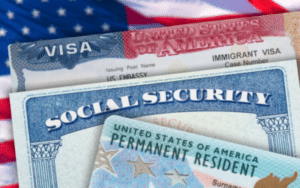You Can Now Reschedule Your Biometrics Appointment Online Previously, applicants had to call the USCIS Contact Center to change the date and time U.S. Citizenship and Immigration Services (USCIS) recently announced that applicants can now reschedule their biometrics appointment online. Previously, applicants had to call the USCIS Contact Center to request a new date and […]
Read More »You Can Now Reschedule Your Biometrics Appointment Online
How to Obtain a Marriage License

How to Obtain a Marriage License Getting married soon? Here are some helpful tips on how to obtain your marriage license Congratulations on your upcoming marriage! With this exciting life event comes some logistical planning, like where and how to obtain a marriage license. In this guide, we’ll cover: Marriage License Basics A marriage license […]
Read More »Can I Travel Abroad While My Adjustment of Status Application Is Pending?

Can I Travel Abroad While My Adjustment of Status Application Is Pending? Find out why it's generally not a good idea to travel while your green card application is processing If you’ve applied for a green card via the adjustment of status process, you may be wondering if you’re permitted to travel outside the U.S. […]
Read More »How to Find Support During the Marriage Green Card Process

How to Find Support During the Marriage Green Card Process How to find help online and in real life for your immigration journey Applying for a marriage-based green card can be a long and difficult journey, both emotionally and logistically. It requires couples to navigate complex legal requirements and financial considerations, as well as manage […]
Read More »Diversity Visa Lottery Winners 2024

Diversity Visa Lottery Winners 2024 Here's how to check your diversity visa status and what to do next if you've been selected The U.S. Department of State has announced the winners for the 2024 Diversity Visa lottery. Out of the millions who entered last year’s lottery, 55,000 applicants have been selected to apply for permanent […]
Read More »What is the K-1 Visa?

Everything you need to know about the fiancé(e) visa The K-1 fiancé visa allows the foreign partner of a U.S. citizen to legally enter the U.S., and once married, apply for a green card through marriage. How long does the K-1 visa take? The wait time for a K-1 visa currently takes 6 months on […]
Read More »How to Register to Vote As a New U.S. Citizen

Learn about the voter registration process Congrats on your citizenship! If you'll be 18 before Election Day, you have the right to vote in federal, state, and local elections. This is your chance to influence the leadership in your community — and in the United States as a whole. In this article, we’ll walk you […]
Read More »K-1 Visa Interview Questions

Fiancé visa interview sample questions to help you prepare The K-1 Interview The K-1 interview is perhaps the biggest cause of anxiety for anyone applying for a fiancé visa. While it’s completely understandable that you find this stressful, rest assured that it probably won’t be as bad as you think. The consular officer will primarily […]
Read More »Former Terms of Use
Terms of Use September 1, 2022-November 10, 2022 Terms of Use July 14, 2014 to August 31, 2022
Read More »Preparing for the J-1 Exchange Visa Interview

How to successfully navigate your J-1 visa interview What to Expect in the J-1 Interview One important step of every J-1 visa application is the visa interview which occurs at the U.S. Embassy or consulate in the applicant’s home country. The visa interview is the last step before the U.S. government is able to determine […]
Read More »